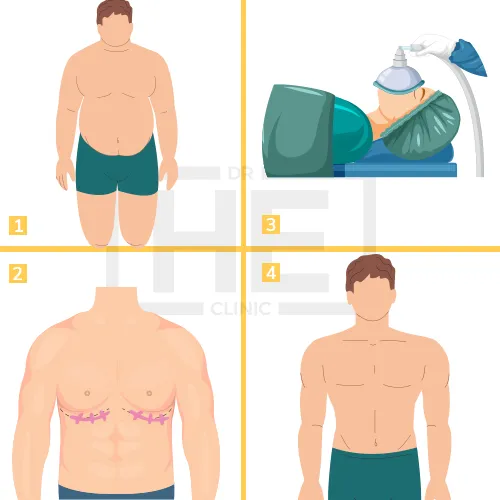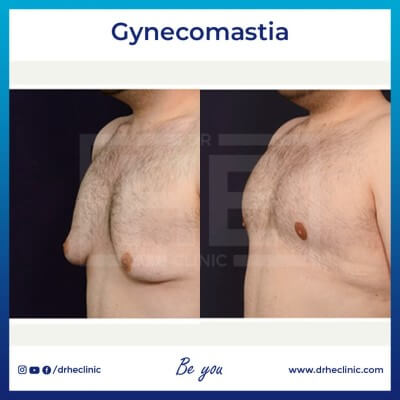What is Gynecomastia?
Gynecomastia is a medical condition characterized by the enlargement of breast tissue in males. It can be caused by hormonal imbalances, certain medications, obesity, and underlying medical conditions.
In Turkey, as in many countries, gynecomastia is a medical condition that can be diagnosed and treated by medical professionals.

Gynecomastia Surgery in Turkey: A Comprehensive Overview
Gynecomastia surgery in Turkey is a popular procedure aimed at reducing enlarged male breasts, restoring a more masculine chest contour. Renowned for high-quality healthcare and affordable prices, Turkey has become a top destination for this corrective surgery.
The process begins with a thorough consultation and medical evaluation to determine the patient’s suitability for the procedure. During the surgery, excess fat and glandular tissue are removed, and the chest is sculpted to achieve a natural, flatter appearance. Skilled plastic surgeons perform the surgery using advanced techniques in modern, high-tech facilities.
Gynecomastia Steps

1. Consultation and Planning
- Choosing a Surgeon: It’s crucial to select a board-certified plastic surgeon experienced in gynecomastia surgery.
- Initial Consultation: Discuss your medical history, any medications you’re taking, and your goals for surgery. The surgeon will examine your chest and possibly take measurements and photographs.
- Surgical Plan: The surgeon will determine the best approach based on the extent of your gynecomastia, which may involve liposuction, excision, or a combination of both.
2. Preoperative Preparations
- Medical Evaluations: You may need to get lab testing or a medical evaluation to ensure you’re fit for surgery.
- Pre-surgery Instructions: These might include guidelines on eating, drinking, and adjusting medications. You might also be advised to stop smoking well before surgery to improve healing.
- Recovery Preparation: Arrange for someone to drive you home post-surgery and help you during your recovery if needed.
3. Anesthesia
- Administration of Anesthesia: Gynecomastia surgery is typically performed under general anesthesia or intravenous sedation to ensure you’re comfortable during the procedure.
4. The Surgical Procedure
- Liposuction Technique: If gynecomastia is primarily caused by excess fatty tissue, liposuction alone may be used. This involves inserting a cannula through small incisions to loosen and vacuum out excess fat.
- Excision Technique: When glandular breast tissue or excess skin must be removed to correct gynecomastia, excision techniques are used. The incision patterns depend on the specific conditions and surgical goals.
- Combination of Liposuction and Excision: Often, both techniques are necessary for optimal results.
5. Recovery
- Immediate Postoperative Care: After surgery, dressings or bandages will be applied to your incisions, and you may be wrapped in an elastic bandage or wear a support garment to minimize swelling and support your new chest contour as it heals.
- Home Recovery: You’ll receive specific instructions on how to care for the surgical site, medications to apply or take orally, and when to follow up with your surgeon.
- Activity Restrictions: You’ll need to limit physical activity for a time recommended by your surgeon to ensure proper healing.
6. Postoperative Care and Observation
- Pain Management: You may experience some pain, swelling, and bruising, which can be managed with medications prescribed by your surgeon.
- Follow-up Visits: These are crucial for monitoring your recovery and ensuring the best possible outcome.
7. Long-term Care and Outcome
- Scar Management: Incision lines are permanent but will gradually fade and significantly improve over time. Your surgeon may recommend scar care treatments.
- Maintaining Results: Keeping a stable weight and healthy lifestyle post-surgery can help maintain the results.

Need Help? Contact Us!
7/24 Obesity Help Desk
Breast Aesthetics
Gynecomastia Cost in Turkey
The average cost of Gynecomastia in Turkey ranges from $2,000 to $3,500. This includes the surgeon’s fee, anesthesia, hospital fees, and accommodation. The specific cost of the procedure will vary depending on the extent of excess skin, the desired outcome, the surgeon’s experience, and the complexity of the procedure.
| Region | Average Gynecomastia Cost |
 Turkey Turkey | $2,000 – $3,500 or more |
 USA USA | $8,000 – $12,000 or more |
 Canada Canada | $8,000 – $12,000 or more |
 UK UK | £5,000 – £8,000 or more |
 Australia Australia | AUD 8,000 – AUD 15,000 or more |
 Germany Germany | €8,000 – €10,000 or more |
 France France | €7,000 – €10,000 or more |
Why does Gynecomastia Cost in Turkey Cheap?
- Exchange rate: Favorable exchange rates for foreign currencies relative to the Turkish lira can make procedures even cheaper for international patients.
- Standardized procedures: Many Turkish clinics employ standardized protocols and techniques for common procedures like Breast Augmentation Surgery, achieving efficiency and cost savings.

Gynecomastia Before and After Photos
Submit your request for access to before and after photos to see actual patient results from our many cosmetic procedures and treatments at Dr. HE Clinic.
Gynecomastia Reviews


Posted on
Truspilot
Posted on
TruspilotIs it Safe To Have A Gynecomastia in Turkey?
Frequently Asked Questions About Gynecomastia
Why Get Gynecomastia Surgery in Turkey?
Gynecomastia surgery in Turkey has gained popularity in recent years, and many individuals choose to undergo the procedure there for several reasons. Here are some factors that contribute to Turkey’s appeal for gynecomastia surgery:
Highly Skilled Surgeons: Turkey is known for having a large number of skilled and experienced plastic surgeons who specialize in gynecomastia surgery. Many surgeons in Turkey have received training and education in renowned medical institutions both domestically and internationally. The expertise and qualifications of Turkish surgeons attract patients seeking quality care.
Advanced Medical Facilities: Turkey has made significant investments in healthcare infrastructure, including state-of-the-art medical facilities equipped with advanced technologies. Many private clinics and hospitals in Turkey are equipped with modern operating rooms and follow international standards for patient safety and care.
Competitive Pricing: Gynecomastia surgery in Turkey is often more affordable compared to other countries. The cost of the procedure, including surgeon fees, facility charges, and post-operative care, tends to be lower in Turkey while still maintaining high-quality standards. This cost advantage makes Turkey an attractive destination for individuals seeking cost-effective medical treatments.
Medical Tourism Services: Turkey has developed a robust medical tourism industry and is known for its comprehensive medical tourism services. There are numerous agencies and facilitators that specialize in organizing medical trips to Turkey, assisting patients with travel arrangements, accommodation, and coordinating with healthcare providers. These services make the process smoother and more convenient for international patients.
Tourism Opportunities: Turkey offers a rich cultural heritage, stunning landscapes, and vibrant cities, making it an appealing tourist destination. Many patients choose to combine their gynecomastia surgery with a vacation in Turkey, taking advantage of the opportunity to explore the country before or after their procedure.
Despite the advantages, it’s essential to thoroughly research and choose a reputable surgeon and medical facility in Turkey. Look for surgeons who are board-certified, have a proven track record of successful gynecomastia surgeries, and have positive patient reviews. Additionally, carefully consider the potential risks and challenges of traveling abroad for surgery, such as language barriers and follow-up care.
Before making a decision, consult with your local healthcare provider and gather as much information as possible about the specific surgeon, clinic, and associated costs. Ultimately, the decision to undergo gynecomastia surgery in Turkey should be based on a careful evaluation of your individual needs, preferences, and comfort level with international medical travel.
How Much is Gynecomastia Surgery Cost in Istanbul, Turkey?
The cost of gynecomastia surgery in Istanbul, Turkey can vary depending on several factors, including the complexity of the procedure, the surgeon’s experience and reputation, the location and reputation of the clinic or hospital, and the specific services included in the package. It is important to note that the following figures are approximate and can vary:
On average, the cost of gynecomastia surgery in Istanbul, Turkey ranges from $2,000 to $4,500. This cost generally includes the surgeon’s fees, anesthesia, hospital or clinic charges, post-operative garments, and follow-up visits.
However, it’s important to consider that additional costs may not be included in the initial price estimate. These can include pre-operative tests, medications, post-operative care and medications, and any potential complications or revisions that may arise.
It’s crucial to consult with multiple reputable clinics or hospitals in Istanbul to get detailed quotes and understand what is included in the cost. Some facilities may offer package deals that include airport transfers, accommodation, and additional support services for international patients.
While cost is an important factor to consider, it is equally important to prioritize the quality and safety of the procedure. Ensure that the surgeon and the facility have the necessary qualifications, certifications, and positive patient reviews.
Furthermore, it’s important to note that traveling for surgery carries additional considerations such as travel expenses, accommodation, and potential language and cultural differences. Make sure to factor these into your overall budget and carefully evaluate the risks and benefits of traveling abroad for medical treatment.
Ultimately, it is advisable to consult with a few qualified plastic surgeons or clinics in Istanbul to obtain personalized cost estimates based on your specific case and requirements.
Why is gynecomastia surgery cheap in Turkey?
The lower cost of gynecomastia surgery in Turkey compared to some other countries can be attributed to several factors:
Lower operating costs: Turkey has a lower cost of living and lower operating costs compared to countries like the United States, Canada, or Western European countries. This includes factors such as lower overhead costs for clinics and hospitals, lower salaries for medical professionals, and more affordable medical supplies and equipment. These lower operating costs can translate into lower prices for medical procedures, including gynecomastia surgery.
Currency exchange rates: The exchange rate between the Turkish Lira (TRY) and major international currencies, such as the US Dollar or Euro, can work in favor of patients traveling to Turkey for medical procedures. In countries where the patient’s currency is stronger, their money can go further when converting it into Turkish Lira, making the procedure more affordable.
Government incentives: The Turkish government has actively promoted medical tourism in the country and implemented various incentives to attract international patients. These incentives include tax breaks and subsidies for medical facilities, which can help reduce the overall cost of procedures and make them more affordable for patients.
Competition among clinics: Turkey has a highly competitive market for medical tourism, including gynecomastia surgery. The presence of numerous clinics and hospitals specializing in cosmetic procedures creates competition, and providers may offer competitive pricing to attract more patients. This competition can drive down the cost of gynecomastia surgery in Turkey.
It’s important to note that while cost is a significant factor, it should not be the sole determining factor when choosing a surgeon or a medical facility. It’s crucial to prioritize the qualifications, experience, and reputation of the surgeon and the quality of care provided. Thoroughly research the credentials of the surgeon and the facility, read patient reviews, and consider all aspects of the procedure and the overall experience before making a decision.
Which is the best clinic for gynecomastia surgery in Turkey?
As an AI language model, I don’t have access to real-time information or the ability to provide subjective opinions. Determining the “best” clinic for gynecomastia surgery in Turkey can be subjective and dependent on individual preferences and needs. However, there are several reputable clinics in Turkey that specialize in gynecomastia surgery. It is important to consider the following factors when evaluating clinics:
Surgeon’s qualifications and experience: Look for clinics that have experienced plastic surgeons who specialize in gynecomastia surgery. Research the surgeon’s credentials, certifications, and years of experience in performing gynecomastia procedures. You may also want to review their patient before-and-after photos to assess their results.
Clinic accreditation and safety standards: Ensure that the clinic has the necessary accreditations and meets international safety and hygiene standards. Look for certifications such as JCI (Joint Commission International) or ISO (International Organization for Standardization) to ensure a high level of quality and patient safety.
Patient reviews and testimonials: Read reviews and testimonials from previous patients who have undergone gynecomastia surgery at the clinic. Consider their experiences, satisfaction levels, and any feedback they provide regarding the clinic, surgeon, and overall care.
Facilities and equipment: Assess the clinic’s facilities and the availability of modern equipment and technology. A well-equipped clinic with advanced surgical tools and technology can enhance the quality and safety of the procedure.
Communication and support: Consider the clinic’s communication and support services. Look for clinics that have staff who are responsive, helpful, and able to address your queries and concerns promptly. Clear communication and support throughout the process can contribute to a positive experience.
It’s important to conduct thorough research, review multiple clinics, and consult with different surgeons to find the one that best suits your needs and preferences. You may also want to seek recommendations from trusted sources such as your local healthcare provider or individuals who have undergone gynecomastia surgery in Turkey.
How long does gynecomastia surgery take in Turkey ?
The duration of gynecomastia surgery in Turkey can vary depending on several factors, including the extent of the procedure, the surgical technique employed, and the individual patient’s specific case. Generally, the surgery takes approximately 1 to 3 hours to complete. However, it’s important to note that this is just an estimate, and the actual duration can vary.
During your initial consultation with a plastic surgeon in Turkey, they will evaluate your condition and discuss the surgical plan with you. They will be able to provide a more accurate estimate of the expected duration based on your unique situation.
Factors that can influence the duration of the surgery include:
The amount of excess tissue and fat to be removed: If there is a larger amount of tissue and fat to be addressed, it may require a longer surgical procedure.
Surgical technique: The specific technique chosen by the surgeon can impact the duration of the surgery. Techniques such as liposuction alone or a combination of liposuction and tissue excision may require different amounts of time.
Complexity of the case: If there are complicating factors such as significant asymmetry, excess skin, or underlying medical conditions, it may require additional time to address these issues during the surgery.
It’s important to prioritize the quality and thoroughness of the procedure over the duration. The surgeon should take the necessary time to ensure precise and satisfactory results. During your consultation, the surgeon will discuss the expected duration of the surgery and provide you with specific details based on your individual case.
Does Health Insurance Cover Gynecomastia Surgery?
Whether health insurance covers gynecomastia surgery depends on several factors, including the insurance policy, the country you reside in, and the underlying cause of your gynecomastia.
In general, health insurance policies may provide coverage for gynecomastia surgery if it is deemed medically necessary. This means that if gynecomastia is causing physical discomfort, pain, or functional issues, insurance may cover the procedure. However, if gynecomastia is purely a cosmetic concern, insurance coverage may be less likely.
It is important to review your specific health insurance policy or contact your insurance provider directly to understand the coverage details for gynecomastia surgery. They can provide you with information about the specific criteria for coverage, any pre-authorization requirements, and the extent of coverage (such as surgeon fees, hospital charges, anesthesia, etc.).
Keep in mind that insurance coverage for gynecomastia surgery can vary widely between insurance providers and policies. Some policies may have exclusions for cosmetic procedures, while others may cover a portion of the expenses. Additionally, some insurance plans may require documentation and evidence of medical necessity from your healthcare provider to consider coverage.
If your insurance does not cover gynecomastia surgery or only provides partial coverage, you may explore other options such as self-payment, financing plans, or medical tourism in countries where the procedure is more affordable.
It is recommended to consult with your insurance provider and discuss your specific situation to obtain accurate information about coverage and potential out-of-pocket expenses for gynecomastia surgery.
Is Gynecomastia Painful?
Gynecomastia itself, which is the enlargement of male breast tissue, might not necessarily cause pain. However, in some cases, individuals with gynecomastia can experience tenderness, discomfort, or even pain in the chest area due to the increased size of the breast tissue. The degree of pain or discomfort can vary depending on factors such as the underlying cause of gynecomastia, the amount of breast tissue enlargement, and individual sensitivity to pain.
Is there a scar after the Gynecomastia?
Yes, there can be scars after gynecomastia surgery, but the extent and visibility of the scars can vary based on several factors, including the surgical technique used, the individual’s healing process, and the surgeon’s skill.
The two main surgical approaches for gynecomastia surgery are liposuction and surgical excision:
Liposuction: If the main component of the breast enlargement is excess fatty tissue, liposuction may be used. Liposuction involves making small incisions through which a thin tube called a cannula is inserted to suction out the excess fat. The incisions for liposuction are typically very small, and the resulting scars are usually quite minimal and inconspicuous.
Surgical Excision: In cases where the breast enlargement is primarily due to glandular tissue or excess skin, surgical excision is required. This approach involves making incisions to remove the excess tissue and possibly reposition the nipple and areola. The placement of incisions will depend on the specific surgical technique used. Surgeons often strive to make incisions in inconspicuous areas, such as around the areola or within natural creases, to minimize the visibility of scars.
QUALITY CERTIFICATES
















Posted on
Truspilot